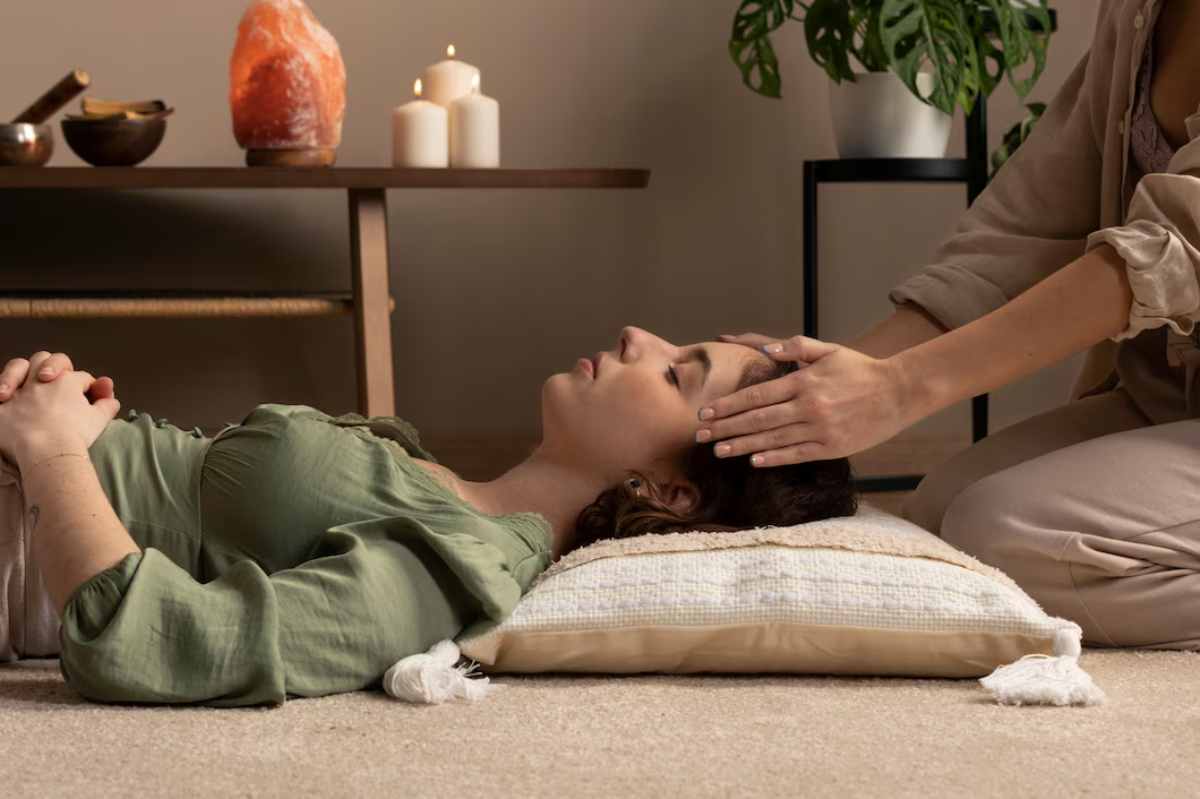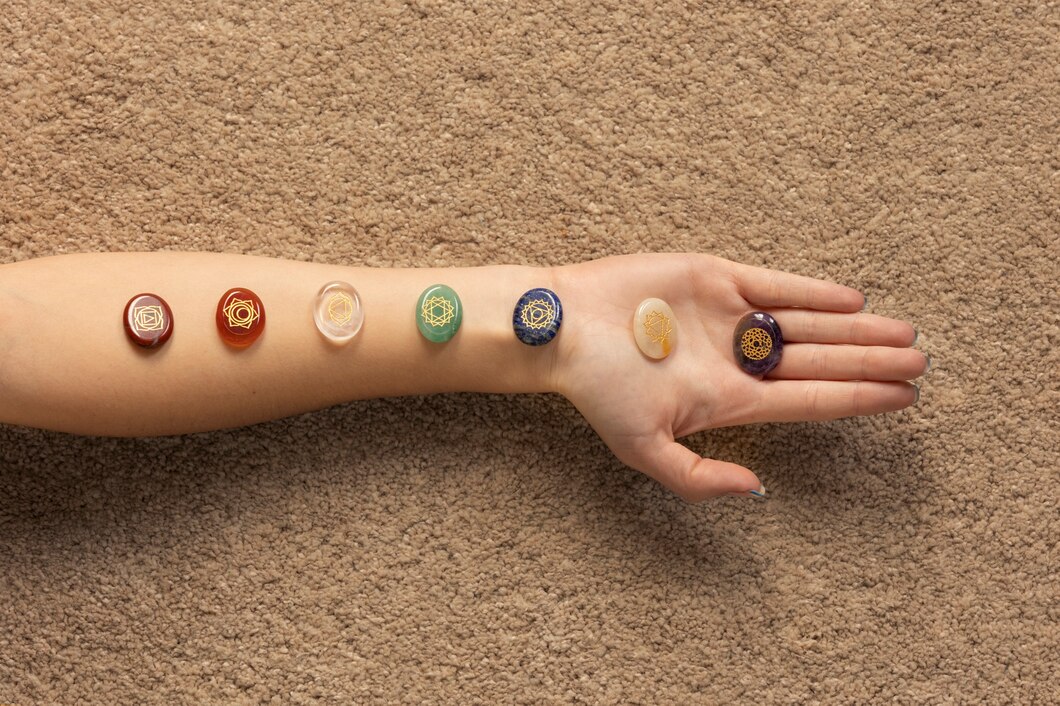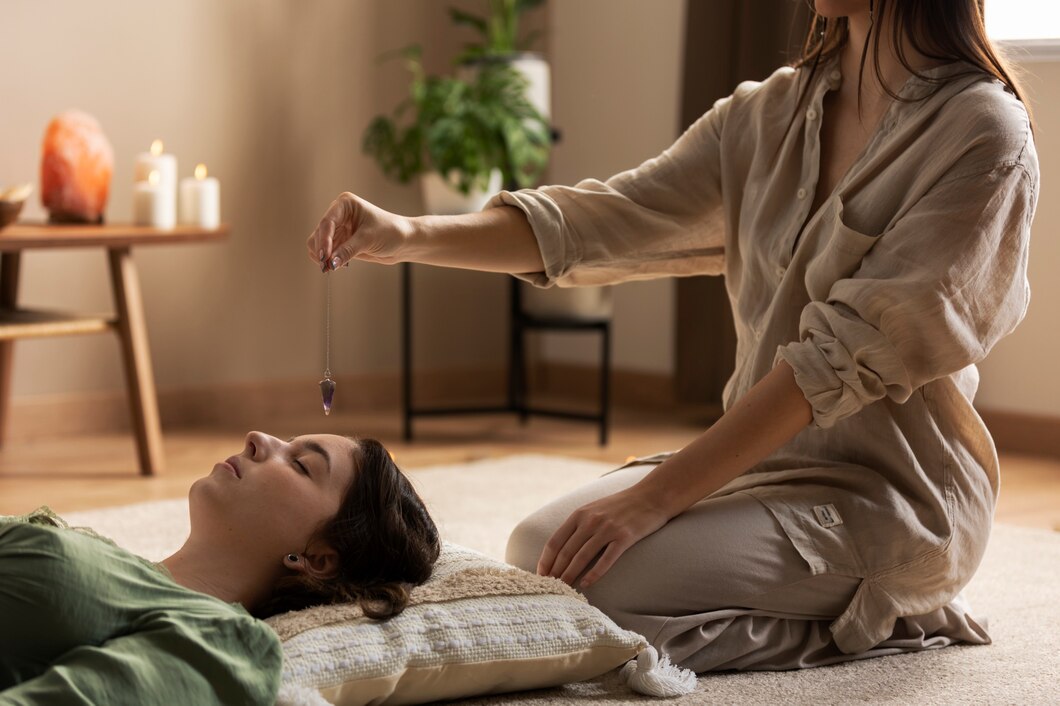
Reiki Healing: How Energy Work Can Improve Your Health
Reiki is a powerful form of energy healing practised for centuries. It promotes relaxation, reduces stress, and enhances spiritual well-being. Originating in Japan, Reiki therapy focuses on a universal life force energy flowing through all living things. When this energy is balanced, it can improve health, emotional stability, and inner peace. This guide explores how Reiki works, its benefits, and how to add it to your wellness routine.
What Is Reiki Therapy?

Reiki therapy is a gentle healing technique. It involves placing hands on or above the body to channel energy. “Reiki” combines two Japanese words: Rei (universal) and Ki (life energy). Practitioners believe transferring this energy helps clear blockages, restore balance, and support well-being.
Quick Guide: Reiki Healing Overview
- What is Reiki?
A Japanese energy healing method that promotes emotional, physical, and spiritual balance by channeling life force energy. - Benefits of Reiki
Reduces stress and anxiety, supports healing, enhances sleep, balances emotions, and deepens spiritual connection. - How Reiki Works
Practitioners lightly place hands on or near the body to clear energy blockages and restore flow. - Getting Started
Try self-Reiki techniques, use crystals, or book a session with a certified practitioner. - Ideal for
Anyone seeking gentle, non-invasive support for mental clarity, emotional healing, and overall wellness.
Pro Tip
For best results, integrate Reiki into your weekly wellness routine—even when you’re feeling well. Consistency enhances the long-term benefits of energy work.
Important
Reiki is a complementary therapy and not a substitute for medical care. Always consult a healthcare professional for any medical condition. Use Reiki as a supportive tool alongside other treatments.
Key Principles of Reiki
Reiki is guided by five principles, known as the Five Reiki Precepts:
- Only for today, do not be angry.
- Only for today, do not worry.
- Only for today, be grateful.
- Work honestly today.
- Only for today, be kind to all living things.
Embracing these principles helps cultivate peace and emotional resilience, which is crucial for spiritual well-being.
How does Reiki healing work?
Energy healing practices like Reiki believe the body has an energy field. This field influences both physical and emotional health. When energy is stagnant or blocked, it can cause discomfort or illness. Reiki restores harmony by clearing these blockages, allowing energy to flow freely.
The Reiki session process
A typical Reiki therapy session includes these steps:
- The recipient lies fully clothed in a quiet, relaxing space.
- The practitioner lightly places their hands on or above different body areas.
- Energy flows through the hands to help clear imbalances.
- Sessions usually last 30 to 60 minutes, promoting deep relaxation.
Many report feeling warmth, tingling, or calmness during a session, indicating energy movement.
Pro Tip: Drink water after a Reiki session to flush out toxins released during healing.
The Benefits of Reiki Therapy

Reiki supports both physical and emotional health. Here are some key benefits of adding Reiki therapy to your wellness routine:
1. Reduces Stress & Anxiety
Reiki induces deep relaxation, lowering stress levels and promoting emotional balance.
- Activates the parasympathetic nervous system to reduce stress hormones.
- Encourages mindfulness, leading to greater peace of mind.
- Complements meditation practices for enhanced spiritual well-being.
2. Supports Physical Healing
Reiki often complements conventional medicine to aid in healing from illnesses and injuries.
- Boosts the immune system by reducing stress-related inflammation.
- It helps manage pain, especially for chronic conditions like arthritis or migraines.
- Speeds recovery after surgery or physical trauma.
3. Enhances Emotional Well-Being
Regular Reiki sessions help balance emotions, making life’s challenges easier.
- Releases suppressed emotions and promotes emotional clarity.
- Aids in grief, depression, and trauma recovery.
- Strengthens self-awareness and inner peace.
4. Improves Sleep Quality
Many recipients find more profound, more restorative sleep from Reiki.
- Calms an overactive mind, reducing nighttime anxiety.
- Encourages melatonin production, which is essential for sleep.
- It supports relaxation, making it easier to fall asleep.
5. Deepens Spiritual Connection
For those seeking spiritual well-being, Reiki is a tool for self-discovery and alignment.
- Encourages a sense of purpose and interconnectedness.
- Enhances intuition and mindfulness practices.
- Supports energy alignment in the chakras and aura.
Pro Tip: Pair Reiki with meditation or breathwork for a richer spiritual experience.
How to Incorporate Reiki Healing into Your Life
You can practice energy healing at home, even though working with a certified Reiki practitioner is helpful.
1. Self-Reiki Practices
You don’t need to be a master to use healing energy. Simple self-Reiki techniques include:
- Placing hands on your heart or stomach while taking deep breaths.
- Setting healing intentions and focusing on discomfort.
- Meditating with Reiki symbols or visualising energy flowing through your body.
2. Reiki and Crystals
Many combine Reiki with crystal healing to enhance its effects.
- Amethyst: Supports emotional balance and relaxation.
- Clear Quartz: Enhances energy flow and healing intentions.
- Rose Quartz: Promotes self-love and emotional healing.
3. Reiki for Chakra Balancing
Chakras are energy centres in the body that affect health. Reiki balances these chakras by removing blockages.
- Root Chakra: Grounding and stability.
- Heart Chakra: Emotional healing and love.
- Crown Chakra: Spiritual awareness and enlightenment.
Pro Tip: A Reiki session focusing on chakras can restore equilibrium if you feel unbalanced.
Finding a Reiki Practitioner
If you’re new to Reiki therapy, working with an experienced healer can provide deeper insights. When choosing a practitioner, consider:
- Credentials & Experience: Look for certified practitioners with good reviews.
- Session Approach: Some use sound healing, aromatherapy, or guided meditation.
- Comfort Level: Choose someone whose energy resonates with you for the best experience.
Many sessions are available remotely, as energy is not limited by space.
Pro Tip: Check holistic wellness centres or Reiki associations for reputable practitioners nearby.
5 Frequently Asked Questions (FAQs)
- What does a Reiki session feel like?
Most people report feeling deeply relaxed, with sensations of warmth, tingling, or emotional release during or after a session. - Can Reiki help with chronic conditions?
While it’s not a cure, Reiki may help manage symptoms by reducing stress and promoting the body’s natural healing process. - Is Reiki connected to any religion?
No, Reiki is not religious. It is a spiritual practice that works with energy, suitable for people of all belief systems. - Do I need to remove my clothes for Reiki?
No, Reiki is performed while you are fully clothed, usually lying down in a quiet, comfortable setting. - Can I learn to do Reiki on myself?
Yes, many people take Level 1 Reiki training to learn self-healing techniques that can be used at home.
Share your Thoughts

Reiki is a gentle yet powerful form of energy healing. It promotes emotional balance, physical well-being, and spiritual well-being. Reiki therapy can help with stress relief, better sleep, and deeper self-awareness. It offers many benefits. Regular practice makes Reiki a useful tool for finding harmony and well-being.
Have you tried Reiki? Share your experiences in the comments below!


